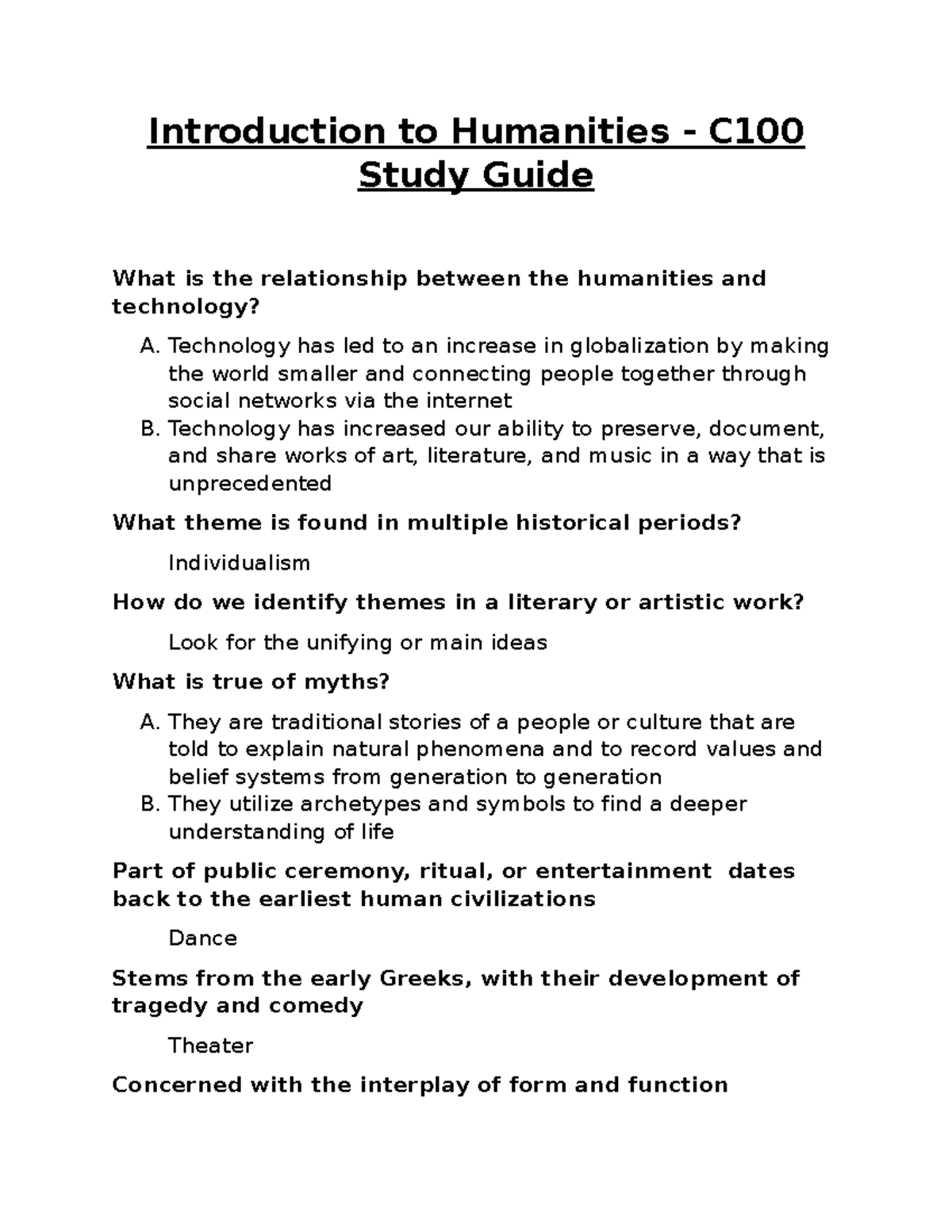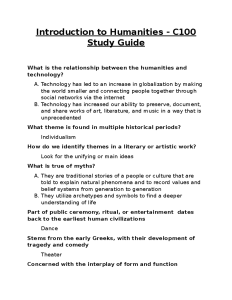Introductory humanities courses play a crucial role in shaping students’ first-year experience, particularly at institutions like Harvard. These courses are designed to ignite curiosity about the arts and humanities, engaging students with a diverse array of topics that unfold the complexities of human culture. As enrollments in the humanities fluctuate, innovative course offerings aim to capture the attention of new students, ensuring they explore their interests deeply. With a focus on engaging students, the initiative led by Dean Sean Kelly brings forth fresh perspectives and interdisciplinary approaches to the study of literature, philosophy, and the arts. By highlighting the intrinsic value of humanities education, these introductory courses aspire to inspire a new generation of thinkers and creators.
When considering foundational courses in the liberal arts, it is important to recognize how they foster critical thinking and creativity among emerging scholars. Starting off their academic journeys with engaging programs not only provides first-year students a chance to immerse themselves in cultural studies but also encourages them to appreciate the relationship between creativity and intellect. This approach reflects a comprehensive introduction to arts-related disciplines, encompassing literature, philosophy, and visual arts, all of which are vital for understanding the human experience. Furthermore, an emphasis on interaction and relatability within these courses resonates with students, enhancing their educational motivation. Altogether, these introductory offerings highlight a transformative pathway for students as they navigate their academic pursuits and personal development.
The Importance of Introductory Humanities Courses
Introductory humanities courses play a critical role in shaping the academic journey of first-year students at institutions like Harvard. These courses serve as gateways to the arts and humanities, offering students the essential foundational knowledge and skills necessary for critical thinking and engagement with complex ideas. By exposing newcomers to diverse artistic and philosophical perspectives, these courses encourage them to explore the intrinsic value of human creativity and cultural expression. The integration of humanities studies is vital in developing well-rounded individuals who appreciate the nuance and depth of human experience.
Moreover, introductory courses are designed to capture the interest of students who may have initially considered concentration in other fields. By presenting compelling content and relatable themes, these courses can rekindle students’ passion for the arts and humanities. The new offerings at Harvard aim to not only enrich the educational experience but also address the national trend of declining enrollment in these disciplines. With innovative approaches and fresh perspectives, educators hope to transform the narrative surrounding humanities studies and inspire a new generation of thinkers.
Engaging First-Year Students in the Arts
Engaging first-year students with the arts is a pivotal strategy in revitalizing their interest in the humanities. As Dean Sean Kelly points out, capturing the attention of students with innovative and relatable course offerings is essential for fostering a deeper appreciation of the subject matter. The arts provide a unique lens through which students can explore fundamental human questions, stirring curiosity and prompting critical engagement. Courses centered on creative writing, visual arts, and cultural studies not only enhance students’ educational journeys but also encourage them to express their own perspectives and experiences through artistic mediums.
Courses such as ‘Culture in Context’ and ‘Migration and Border Crossing in Film and Photography’ highlight the relevance of the arts in addressing contemporary societal issues. By situating artistic exploration within a broader cultural context, these classes motivate students to consider their role within society and the influence of the arts on social change. Ultimately, engaging students through the arts not only enriches their academic experience but also equips them with the tools to navigate and contribute meaningfully to the world around them.
Innovative Course Offerings in the Humanities
The launch of nine innovative introductory courses in the humanities represents a progressive shift in academia aimed at rekindling interest in the arts and humanities among first-year students. These courses are designed not only to cover foundational concepts but also to delve into contemporary themes that resonate with students today. Offering diverse perspectives—from medical humanities to the study of iconic musicians like Bob Dylan—allows students to connect with the material in a meaningful way, awakening their curiosity and zeal for learning.
Furthermore, the inclusion of these varied courses addresses the challenges posed by historic ‘Canon Wars’ which often left students uncertain about the value of traditional texts. By focusing on accessible works and engaging discussions, educators are committed to creating a learning environment where students feel excited rather than intimidated. This reimagined approach reflects an understanding of the changing dynamics of education and the necessity to engage students with materials that speak to current cultural and social conversations.
The Role of Faculty in Shaping Humanities Education
Faculty members play a crucial role in enriching the educational experiences of their students in humanities courses. With their diverse backgrounds and expertise, professors are instrumental in curating content that is not only academically rigorous but also relatable to the experiences of first-year students. Through collaborative teaching approaches, such as combining literature analysis with creative writing, educators are able to cultivate a dynamic classroom environment that fosters creativity and critical thinking.
Moreover, professors like Laura van den Berg and Neel Mukherjee are pivotal in the initiative to break down barriers between traditional and creative approaches in the humanities. Their commitment to integrating reading comprehension with writing technique exemplifies the evolving nature of humanities education, highlighting the importance of narrative and storytelling in shaping our understanding of the human experience. This innovative approach encourages students to appreciate both the creation and analysis of text, ultimately enriching their academic journey and preparing them for future success.
Fostering a Welcoming Culture in Humanities
Creating a welcoming culture within the humanities is paramount to engaging new students and inspiring them to embrace their academic pursuits. The initiatives led by the Dean of Arts and Humanities highlight a commitment to make the humanities more inclusive and accessible. This cultural shift aims to demystify traditional perceptions of humanities studies, inviting students from all backgrounds to explore their interests freely and wholeheartedly.
Initiatives such as accessible introductory courses and community-driven projects serve to bridge the gap between the classroom and the wider world. By fostering an environment that values diverse perspectives and encourages open dialogue, institutions can cultivate a vibrant intellectual community where ideas flourish, and students feel empowered to contribute. This welcoming atmosphere ultimately enhances the educational landscape, ensuring that the humanities remain a vital part of the academic experience for all students.
Transformative Learning Experiences in the Humanities
Transformative learning experiences in the humanities are centered on exposing students to the power of art, literature, and philosophy in shaping personal and societal narratives. By engaging first-year students in profound inquiries and compelling discussions, these courses encourage them to reflect on their beliefs, expectations, and aspirations. The humanities serve as a platform for students to grapple with complex themes, providing an environment where they can grow as critical thinkers and empathetic individuals.
The newly launched courses at Harvard aim to intentionally design learning experiences that challenge students to reconsider their assumptions about the world. By examining the implications of metaphor, consciousness, and cultural identity, students develop a nuanced understanding of their relationship with the humanities. These transformative moments are not merely academic; they are foundational in shaping students’ identities and preparing them to navigate the complexities of modern life.
The Impact of Arts and Humanities on Career Paths
Engagement in the arts and humanities often leads to enhanced career readiness by developing transferable skills that are highly sought after in various fields. Through critical analysis, creative problem-solving, and effective communication, students acquire abilities that prepare them for diverse career paths. Rather than viewing the humanities solely as a conduit for academics, students learn that their experiences in these disciplines can translate into numerous professional opportunities across industries.
Moreover, businesses increasingly recognize the value of hiring graduates who possess a well-rounded education, including a strong foundation in the arts and humanities. The ability to think critically and approach problems from multiple perspectives is vital in today’s dynamic workforce. Consequently, introductory courses that encourage students to explore these connections not only enrich their personal growth but also bolster their professional prospects.
Cultivating Critical Thinking through Humanities Studies
Critical thinking is at the heart of humanities education, allowing students to scrutinize texts, engage in debates, and analyze cultural phenomena. By training students to question assumptions and develop coherent arguments, introductory humanities courses cultivate the analytical skills necessary for academic success and thoughtful citizenship. This approach empowers students to understand complex societal issues and encourages them to engage meaningfully in their communities.
Courses like ‘The Human Sciences: Fundamentals and Basic Concepts’ provide a roadmap for students to navigate diverse ideas, helping them build a framework for understanding human behavior and culture. Through discussions surrounding epistemology and morality, the humanities equip students with the tools to critically assess their surroundings and make informed decisions in their personal and professional lives.
The Future of Humanities Education at Harvard
The future of humanities education at Harvard is poised for transformation, with an increased focus on innovative approaches to teaching that resonate with today’s students. As the discipline evolves to meet changing cultural dynamics, there is a renewed commitment to creating engaging courses that evoke curiosity and foster a passion for learning. This dedication to enriching the humanities curriculum reflects a broader understanding of the role these courses play in shaping future leaders.
By continuously adapting to the interests and needs of students, Harvard aims to not only maintain its position as a leader in humanities education but also to ensure that all students can appreciate the relevance of the arts and humanities in their lives. Through engaging course offerings, supportive faculty, and a vibrant learning environment, the university is set to nurture the next generation of thinkers and creators who will carry the legacy of the humanities into the future.
Frequently Asked Questions
What types of introductory humanities courses are offered at Harvard for first-year students?
Harvard offers a diverse array of introductory humanities courses designed for first-year students, including subjects like medical and health humanities, migration and border crossing in film, and the foundational concepts of human sciences. These new course offerings aim to engage students more effectively and spark interest in the arts and humanities.
How do introductory humanities courses engage students at Harvard?
Introductory humanities courses at Harvard focus on relevant and relatable themes, encouraging students to explore fundamental human questions. By incorporating contemporary topics and fostering critical thinking, these courses aim to captivate first-year students and enhance their understanding of the intrinsic value of arts and humanities.
Are there any new courses for first-year students in the arts and humanities at Harvard?
Yes, this academic year, Harvard has launched nine new introductory courses in the arts and humanities targeting first-year students, including courses like ‘Kant’s Critique of Pure Reason’ and ‘Migration and Border Crossing in Film and Photography.’ These offerings seek to address the declining interest in humanities by making them more engaging and accessible.
What is the goal of introductory humanities courses for first-year experience at Harvard?
The goal of introductory humanities courses at Harvard is to provide first-year students with a strong foundation in understanding the arts and humanities while fostering a welcoming learning environment. Dean Sean Kelly emphasizes the importance of showcasing the intrinsic worth of humanities education rather than focusing solely on practical applications.
How do introductory humanities courses at Harvard differ from high school education?
Introductory humanities courses at Harvard aim to fill the gap left by high schools, which may not emphasize arts and humanities sufficiently. These courses are designed to be more engaging and thought-provoking, encouraging first-year students to reconsider their interests in these fields and explore deeper philosophical and artistic questions.
Can first-year students at Harvard change their concentration to humanities later?
Yes, many first-year students at Harvard enter with an interest in the arts and humanities but may reconsider their concentration based on their introductory course experiences. The new humanities offerings are specifically designed to capture student interest and help them make informed decisions about their academic paths.
What impact do the new introductory humanities courses aim to have on students?
The new introductory humanities courses at Harvard are intended to engage students meaningfully, enhancing their appreciation for the humanities. The aim is for these courses to be transformative experiences that inspire students to value arts and humanities in their future studies and life paths.
How do humanities courses at Harvard address the decline in enrollment in arts and humanities fields?
Harvard’s new introductory humanities courses specifically target the enrollment decline by rethinking how these subjects are presented. By focusing on engaging content and addressing the interests of modern students, these courses aim to rejuvenate student interest and involvement in the arts and humanities.
What are some examples of specific themes covered in Harvard’s introductory humanities courses?
Examples of themes in Harvard’s introductory humanities courses include the intersection of humanity and technology, the exploration of migration through film and photography, and foundational philosophical concepts that relate to human culture. These themes are designed to resonate with students’ interests while exploring essential human questions.
| Key Points | Details |
|---|---|
| Introduction of New Courses | Nine new introductory courses in arts and humanities aimed at first-year students. |
| Engagement Goals | Increase student interest and enrollment in the humanities, which has seen a decline. |
| Historical Context of Enrollment | Discussion of the influence of high school curriculum on college choices; many first-years shift away from arts and humanities. |
| Inspirational Examples | Philosophy department courses led to increased enrollment by connecting coursework to fundamental human questions. |
| Course Offerings | Includes unique subjects like health humanities, migration in film, and the human sciences. |
| Integration of Disciplines | Courses aim to blend critical reading with creative writing, showcasing the interrelatedness of disciplines. |
| Philosophical Approach | Courses designed to explore human existence and promote intrinsic understanding of humanities. |
| Vision for the Future | Sean Kelly emphasizes fostering a stimulating culture that appreciates the humanities’ intrinsic value. |
Summary
Introductory humanities courses are designed to provide first-year students with engaging and transformative educational experiences that appreciate the arts and humanities. Dean Sean Kelly’s initiative reflects a deep commitment to nurturing a passionate understanding of these disciplines, counteracting declining enrollment trends by emphasizing the relevance and value of the humanities to comprehending the human experience. By offering a diverse array of compelling courses, the program aims to revitalize interest and foster a greater appreciation for the arts and humanities among the student body.




